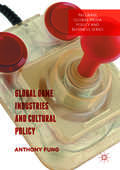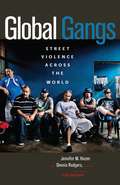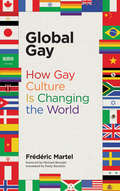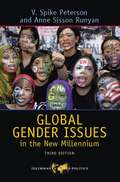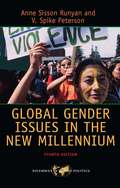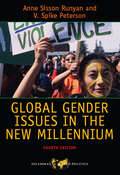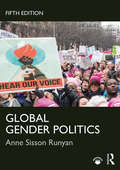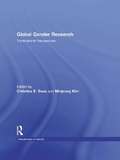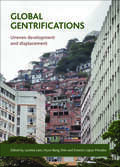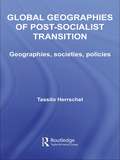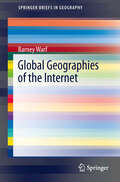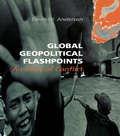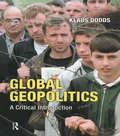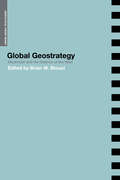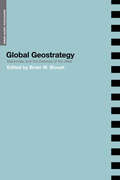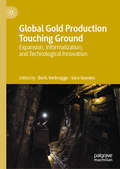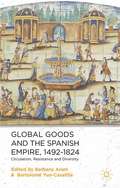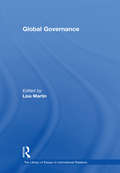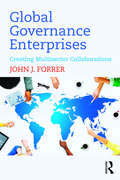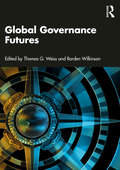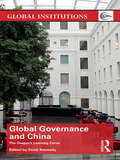- Table View
- List View
Global Game Industries and Cultural Policy
by Anthony FungThis is the first book that sheds light on global game industries and cultural policy. The scope covers the emerging and converging theory and models on cultural industries and its development, and their connection to national cultural policy and globalization. The primary focus of the book is on Asian cultural policy and industries while there are implicit comparisons throughout the book to compare Asia to other global markets. This book is aimed at advanced undergraduates, graduate students and faculty members in programs addressing cultural policy and digital games. It will also be of interest to those within the cultural policy community and to digital games professionals.
Global Gangs: Street Violence across the World
by Dennis Rodgers Jennifer M. HazenGangs, often associated with brutality and senseless destructive violence, have not always been viewed as inherently antagonistic. The first studies of gangs depicted them as alternative sources of order in urban slums where the state&’s authority was lacking, and they have subsequently been shown to be important elements in some youth life cycles. Despite their proliferation there is little consensus regarding what constitutes a gang. Used to denote phenomena ranging from organized crime syndicates to groups of youths who gather spontaneously on street corners, even the term &“gang&” is ambiguous. Global Gangs offers a greater understanding of gangs through essays that investigate gangs spanning across nations, from Brazil to Indonesia, China to Kenya, and from El Salvador to Russia. Volume editors Jennifer M. Hazen and Dennis Rodgers bring together contributors who examine gangs from a comparative perspective, discussing such topics as the role the apartheid regime in South Africa played in the emergence of gangs, the politics behind child vigilante squads in India, the relationship between immigration and gangs in France and the United States, and the complex stigmatization of youths in Mexico caused by the arbitrary deployment of the word &“gang.&” Featuring an afterword by renowned U.S. gang researcher Sudhir Venkatesh, this volume provides a comprehensive look into the experience of gangs across the world and in doing so challenges conventional notions of identity. Contributors: Enrique Desmond Arias, George Mason U; José Miguel Cruz, Florida International U; Steffen Jensen, DIGNITY–Danish Institute Against Torture; Gareth A. Jones, London School of Economics and Political Science; Marwan Mohammed, École Normale Supérieure, Paris; Jacob Rasmussen, Roskilde U; Loren Ryter, U of Michigan; Rustem R. Safin, National Research Technological U, Russia; Alexander L. Salagaev, National Research Technological U, Russia; Atreyee Sen, U of Manchester; Mats Utas, Nordic Africa Institute; Sudhir Venkatesh, Columbia U; James Diego Vigil, U of California, Irvine; Lening Zhang, Saint Francis U.
Global Gay: How Gay Culture Is Changing the World (The\mit Press Ser.)
by Frederic MartelA panoramic view of gay rights, gay life, and the gay experience around the world.In Global Gay, Frédéric Martel visits more than fifty countries and documents a revolution underway around the world: the globalization of LGBT rights. From Saudi Arabia to South Africa, from Amsterdam to Tel Aviv, from Singapore to the United States, activists, culture warriors, and ordinary people are part of a movement. Martel interviews the proprietor of a “gay-friendly” café in Amman, Jordan; a Cuban-American television journalist in Fort Lauderdale, Florida; a South African jurist who worked with Nelson Mandela to enshrine gay rights in the country's constitution; an American lawyer who worked on the campaign for marriage equality; an Egyptian man who fled his country after escaping a raid on a gay club; and many others. He tells us that in China, homosexuality is neither prohibited nor permitted, and that much Chinese gay life takes place on social media; that in Iran, because of the strict separation of the sexes, it seems almost easier to be gay than heterosexual; and that Raul Castro's daughter, a gay rights icon in Cuba, expressed her lingering anti-American sentiments by calling for Pride celebrations in May rather than June. Ten countries maintain the death penalty for homosexuals. “Homophobia is what Arab governments give to Islamists to keep them calm,” one activist tells Martel.Martel finds that although the “gay American way of life” has created a global template for gay activism and culture, each country offers distinctly local variations. And around the world, the status of gay rights has become a measure of a country's democracy and modernity.This English edition, which has been thoroughly revised and updated, has received the French Voices Award for excellence in publication and translation, supported by a grant from the French-American Book Fund.
Global Gender Issues in the New Millennium
by V. Spike Peterson Anne Sisson RunyanWritten by Peterson (political science, U. of Arizona) and Runyan (women's, gender, and sexuality studies, U. of Cincinnati), this textbook on global gender issues is reflective of the contemporary feminist international relations scholarship typically found in the pages of the International Feminist Journal of Politics as combined with recent work in transnational feminist inquiry more generally. Chapters address: analyzing world politics through a gendered lens, gender and global governance, gender and global security, gender and global political economy, and gendered resistance politics. Annotation ©2009 Book News, Inc. , Portland, OR (booknews. com)
Global Gender Issues in the New Millennium
by V. Spike Peterson Anne Sisson RunyanGlobal Gender Issues in the New Millennium argues that the power of gender works to help keep gender, race, class, sexual, and national divisions in place despite increasing attention to gender issues in the study and practice of world politics. Accessible and student-friendly for both undergraduate and graduate courses, authors Anne Sisson Runyan and V. Spike Peterson analyze gendered divisions of power and resources that contribute to the worldwide crises of representation, violence, and sustainability. They emphasize how hard-won attention to gender equality in world affairs can be co-opted when gender is used to justify or mystify unjust forms of global governance, international security, and global political economy.In the new and updated fourth edition, Runyan and Peterson examine the challenges of forging transnational solidarities to de-gender world politics, scholarship, and practice through renewed politics for greater representation and redistribution. Yet they see promise in coalitional struggles to re-radicalize feminist world political demands to change the downward conditions of women, men, children, and the planet. Updated to include framing questions at the opening of each chapter, discussion questions and exercises at the end of each chapter, and updated data on gender statistics and policymaking. Chapters One and Two have also been revised to provide more support to readers with less of a background in gender politics. Case studies and web resources are now also provided.
Global Gender Issues in the New Millennium
by V. Spike Peterson Anne Sisson RunyanGlobal Gender Issues in the New Millennium connects the inequalities between and among women and men with the world politics of global governance, security, political economy, and ecology. Through historical, theoretical, and empirical analysis, the authors alert us to gendered divisions of power, violence, labor and resources, as well as the power of gender as a meta-lens that keeps gender, race, class, sexual, and national divisions in place, despite some re-positionings of some women and men on the world political stage. In this completely new edition, which reflects significant advances in feminist international relations and transnational feminist scholarship, the authors apply intersectional analysis to global governance, militarization, global economic restructuring, and environmental degradation. They explore how crises of representation, insecurity, and sustainability have widened and deepened--particularly in the post-9/11 period--while at the same time global gender policymaking (quotas, gender mainstreaming, and the advancing of women's human rights) has increased. The authors focus on this apparent contradiction--the higher level of attention to gender and women's human rights in a time of fierce militarization, savage economic inequality, and ecological crisis--but also address how the power of gender, as a meta-lens that orders world politics, can be deconstructed to rethink identities, ideologies, structures, and policies that rest upon gendered processes of imperialism, neoliberalism, racialization, and sexualization. The book emphasizes how hard-won attention to gender equality in world affairs can be co-opted when gender is used to justify or mystify unjust global governance, global security, and global political economy, but at the same time sees promise in coalitional struggles to re-radicalize feminist world political demands to change the downward conditions of women, men, children, and the planet. Thus, the authors also examine the challenges of forging transnational solidarities to de-gender world politics, scholarship, and practice through renewed politics of representation and redistribution.
Global Gender Issues in the New Millennium
by V. Spike Peterson Anne Sisson RunyanGlobal Gender Issues in the New Millennium connects the inequalities between and among women and men with the world politics of global governance, security, political economy, and ecology. Through historical, theoretical, and empirical analysis, the authors alert us to gendered divisions of power, violence, labor and resources, as well as the power of gender as a meta-lens that keeps gender, race, class, sexual, and national divisions in place, despite some re-positionings of some women and men on the world political stage. In this completely new edition, which reflects significant advances in feminist international relations and transnational feminist scholarship, the authors apply intersectional analysis to global governance, militarization, global economic restructuring, and environmental degradation. They explore how crises of representation, insecurity, and sustainability have widened and deepened--particularly in the post-9/11 period--while at the same time global gender policymaking (quotas, gender mainstreaming, and the advancing of women's human rights) has increased. The authors focus on this apparent contradiction--the higher level of attention to gender and women's human rights in a time of fierce militarization, savage economic inequality, and ecological crisis--but also address how the power of gender, as a meta-lens that orders world politics, can be deconstructed to rethink identities, ideologies, structures, and policies that rest upon gendered processes of imperialism, neoliberalism, racialization, and sexualization. The book emphasizes how hard-won attention to gender equality in world affairs can be co-opted when gender is used to justify or mystify unjust global governance, global security, and global political economy, but at the same time sees promise in coalitional struggles to re-radicalize feminist world political demands to change the downward conditions of women, men, children, and the planet. Thus, the authors also examine the challenges of forging transnational solidarities to de-gender world politics, scholarship, and practice through renewed politics of representation and redistribution.
Global Gender Issues in the New Millennium
by V. Spike Peterson Anne Sisson RunyanGlobal Gender Issues in the New Millennium connects the inequalities between and among women and men with the world politics of global governance, security, political economy, and ecology. Through historical, theoretical, and empirical analysis, the authors alert us to gendered divisions of power, violence, labor and resources, as well as the power of gender as a meta-lens that keeps gender, race, class, sexual, and national divisions in place, despite some re-positionings of some women and men on the world political stage. In this completely new edition, which reflects significant advances in feminist international relations and transnational feminist scholarship, the authors apply intersectional analysis to global governance, militarization, global economic restructuring, and environmental degradation. They explore how crises of representation, insecurity, and sustainability have widened and deepened—particularly in the post-9/11 period—while at the same time global gender policymaking (quotas, gender mainstreaming, and the advancing of women’s human rights) has increased. The authors focus on this apparent contradiction—the higher level of attention to gender and women’s human rights in a time of fierce militarization, savage economic inequality, and ecological crisis—but also address how the power of gender, as a meta-lens that orders world politics, can be deconstructed to rethink identities, ideologies, structures, and policies that rest upon gendered processes of imperialism, neoliberalism, racialization, and sexualization. The book emphasizes how hard-won attention to gender equality in world affairs can be co-opted when gender is used to justify or mystify unjust global governance, global security, and global political economy, but at the same time sees promise in coalitional struggles to re-radicalize feminist world political demands to change the downward conditions of women, men, children, and the planet. Thus, the authors also examine the challenges of forging transnational solidarities to de-gender world politics, scholarship, and practice through renewed politics of representation and redistribution.
Global Gender Issues in the New Millennium
by V. Spike Peterson Anne Sisson RunyanGlobal Gender Issues in the New Millennium argues that the power of gender works to help keep gender, race, class, sexual, and national divisions in place despite increasing attention to gender issues in the study and practice of world politics. Accessible and student-friendly for both undergraduate and graduate courses, authors Anne Sisson Runyan and V. Spike Peterson analyze gendered divisions of power and resources that contribute to the worldwide crises of representation, violence, and sustainability. They emphasize how hard-won attention to gender equality in world affairs can be co-opted when gender is used to justify or mystify unjust forms of global governance, international security, and global political economy. In the new and updated fourth edition, Runyan and Peterson examine the challenges of forging transnational solidarities to de-gender world politics, scholarship, and practice through renewed politics for greater representation and redistribution. Yet they see promise in coalitional struggles to re-radicalize feminist world political demands to change the downward conditions of women, men, children, and the planet. Updated to include framing questions at the opening of each chapter, discussion questions and exercises at the end of each chapter, and updated data on gender statistics and policymaking. Chapters One and Two have also been revised to provide more support to readers with less of a background in gender politics. Case studies and web resources are now also provided.
Global Gender Issues in the New Millennium (Dilemmas in World Politics )
by Anne Sisson Runyan<p>Global Gender Issues in the New Millennium argues that the power of gender works to help keep gender, race, class, sexual, and national divisions in place despite increasing attention to gender issues in the study and practice of world politics. Accessible and student-friendly for both undergraduate and graduate courses, authors Anne Sisson Runyan and V. Spike Peterson analyze gendered divisions of power and resources that contribute to the worldwide crises of representation, violence, and sustainability. They emphasize how hard-won attention to gender equality in world affairs can be co-opted when gender is used to justify or mystify unjust forms of global governance, international security, and global political economy. <p>In the new and updated fourth edition, Runyan and Peterson examine the challenges of forging transnational solidarities to de-gender world politics, scholarship, and practice through renewed politics for greater representation and redistribution. Yet they see promise in coalitional struggles to re-radicalize feminist world political demands to change the downward conditions of women, men, children, and the planet. Updated to include framing questions at the opening of each chapter, discussion questions and exercises at the end of each chapter, and updated data on gender statistics and policymaking. Chapters One and Two have also been revised to provide more support to readers with less of a background in gender politics. Case studies and web resources are now also provided.</p>
Global Gender Politics (Dilemmas In World Politics Ser.)
by Anne Sisson RunyanAccessible and student-friendly, Global Gender Politics analyzes the gendered divisions of power, labor, and resources that contribute to the global crises of representation, violence, and sustainability. The author emphasizes how hard-won attention to gender and other related inequalities in world affairs is simultaneously being jeopardized by new and old authoritarianisms and depoliticized through reducing gender to a binary and a problem-solving tool in global governance. The author examines gendered insecurities produced by the pursuit of international security and gendered injustices in the global political economy and sees promise in transnational struggles for global justice.In this new re-titled edition of a foundational contribution to the field of feminist International Relations, Anne Sisson Runyan continues to examine the challenges of placing inequalities andresisting injustices at the center of global politics scholarship and practice through intersectional and transnational feminist lenses. This more streamlined approach includes more illustrations and discussions have been updated to refl ect current issues. To provide more support to instructors and readers, Global Gender Politics is accompanied by an e-resource, which includes web resources, suggested topics for discussion, and suggested research activities also found in the book.
Global Gender Research: Transnational Perspectives (Perspectives on Gender)
by Christine Bose Minjeong KimReaders of Global Gender Research will learn to compare and contrast feminist concerns globally, gain familiarity with the breadth of gender research, and understand the national contexts that produced it. This volume provides an in-depth comparative picture of the current state of feminist sociological gender and women's studies research in four regions of the world—Africa, Asia, Latin America/the Caribbean, and Europe—as represented by many countries. The introductory essay to each region explains how social science research on women and/or gender issues has been shaped by economics, politics, and culture, and by trends that are simultaneously local, regional, and global. It familiarizes readers with the wide range of salient issues, research methods, writing styles, and leading authors from around the globe. Each regional section includes several chapters on gender research in specific countries that represent the region's diversity and cover the major theoretical and empirical trends that have emerged over time, as well as the relationship of key research questions to feminist activism and women’s or gender studies. Next, the editors illustrate this new wave of gender scholarship with translated/reprinted samples of research articles from additional countries in the region, that cover a wide range of important global topics—such as work, sexuality, masculinities, childcare and family issues, religion, violence, law and gender policies. Finally, this volume provides scholars with extensive bibliographies and a listing of web sites for women’s and gender research centers in 85 countries.
Global Gentrifications: Uneven Development and Displacement
by Loretta Lees, Hyun Bang Shin and Ernesto López-MoralesUnder contemporary capitalism the extraction of value from the built environment has escalated, working in tandem with other urban processes to lay the foundations for the exploitative processes of gentrification world-wide. Global gentrifications: Uneven development and displacement critically assesses and tests the meaning and significance of gentrification in places outside the ‘usual suspects’ of the Global North. Informed by a rich array of case studies from cities in Asia, Latin America, Africa, Southern Europe, and beyond, the book (re)discovers the important generalities and geographical specificities associated with the uneven process of gentrification globally. It highlights intensifying global struggles over urban space and underlines gentrification as a growing and important battleground in the contemporary world. The book will be of value to students and academics, policy makers, planners and community organisations.
Global Geographies of Post-Socialist Transition: Geographies, societies, policies (Routledge Studies in Human Geography)
by Tassilo HerrschelSince the formal raising of the Iron Curtain, there has been much interest in post-socialism and the process of post-socialist transition. This timely book provides a systematic review and analysis of the process of ‘transition’. Herrschel: explores recent theories, concepts and debates on post-socialism and the notion of transition provides a systematic, topical account of post-socialist transitions around the world, as evidence by social, economic, and political processes examines case studies of post-socialist transition in east and Central Europe, the former Soviet Union, Asia and South-East Asia, and Africa and Latin America brings together theoretical and practical aspects by examining what lessons can be learned from recent experiences. Global Geographies of Post-Socialist Transition provides a truly global comparative account of the meaning and processes of post-socialist transition and will be an invaluable resource for all those interested in this area.
Global Geographies of the Internet
by Barney WarfToday, roughly 2 billion people use the internet, and its applications have flourished in number and importance. This volume will examine the growth and geography of the internet from a political economy perspective. Its central motivation is to illustrate that cyberspace does not exist in some aspatial void, but is deeply rooted in national and local political and cultural contexts. Toward that end, it will invoke a few major theorists of cyberspace, but apply their perspectives in terms that are accessible to readers with no familiarity with them. Beyond summaries of the infrastructure that makes the internet possible and global distributions of users, it delves into issues such as the digital divide to emphasize the inequalities that accompany the growth of cyberspace. It also addresses internet censorship, e-commerce, and e-government, issues that have received remarkably little scholarly attention, particularly from a spatial perspective. Throughout, it demonstrates that in cyberspace, place matters, so that no comprehensive understanding of the internet can be achieved without considering how it is embedded within, and in turn changes, local institutional and political contexts. Thus the book rebuts simplistic "death of distance" views or those that assert there is, or can be, a "one-size-fits-all, cookie-cutter" model of the internet applicable to all times and places.
Global Geopolitical Flashpoints: An Atlas of Conflict
by Ewan W. AndersonThis resource describes more than 120 major flashpoints--current and potential conflicts from around the world. The work analyzes each situation, its issues, and present status, and includes specially commissioned maps and extensive bibliographies to aid understanding. Also includes 125 maps.
Global Geopolitics: A Critical Introduction
by Klaus J. DoddsEmploying thematic investigation and illustrated through case studies, Dodds explores how global politics is imagined and practised by countries such as the US and other organisations including Greenpeace, the IMF and CNN International.In addition, the author discusses how issues such as environmental degradation, terror networks, anti-globalisation protests and North-South relations challenge, consolidate and subvert the existing international political system.
Global Geostrategy: Mackinder and the Defence of the West
by Brian W. BlouetThis is a new examination of Halford Mackinder’s seminal global geostrategic work, from the perspective of geography, diplomatic history, political science, international relations, imperial history, and the space age.Mackinder was a man ahead of his time. He foresaw many of the key strategic issues that came to dominate the twentieth century. Until the disintegration of the Soviet Union, western defence strategists feared that one power, or alliance, might come to dominate Eurasia. Admiral Mahan discussed this issue in The Problem of Asia (1900) but Mackinder made the most authoritative statement in "The Geographical Pivot of History" (1904). He argued that in the "closed Heart-Land of Euroasia" was a strategically placed region, with great resources, that if controlled by one force could be the basis of a World Empire. James Kurth, in Foreign Affairs, has commented that it has taken two World Wars and the Cold War to prevent Mackinder’s prophecy becoming reality. In World War I and World War II Germany achieved huge territorial gains at the expense of the Russian empire and the Soviet Union. In the former conflict the Russian empire was defeated by Germany but the western powers insisted that the territorial gains made by Germany, at the treaty of Brest-Litovsk, be given up. In World War II Britain and the US gave material support to Stalin’s totalitarian regime to prevent Nazi Germany gaining control of the territory and resources that might have been a basis for world domination. The west, highly conscious of Mackinder’s dictum (1919) that "Who rules East Europe commands the Heartland," quickly adopted policies to contain the Soviet Union. History has therefore proved Mackinder’s work to be of vital importance to generations of strategic thinking and he remains a key influence in the new millennium.This book will be of great interest to all students and scholars of strategic studies and military history and of geopolitics in particular.
Global Geostrategy: Mackinder and the Defence of the West (Geopolitical Theory)
by Brian W. BlouetThis is a new examination of Halford Mackinder’s seminal global geostrategic work, from the perspective of geography, diplomatic history, political science, international relations, imperial history, and the space age. Mackinder was a man ahead of his time. He foresaw many of the key strategic issues that came to dominate the twentieth century. Until the disintegration of the Soviet Union, western defence strategists feared that one power, or alliance, might come to dominate Eurasia. Admiral Mahan discussed this issue in The Problem of Asia (1900) but Mackinder made the most authoritative statement in "The Geographical Pivot of History" (1904). He argued that in the "closed Heart-Land of Euroasia" was a strategically placed region, with great resources, that if controlled by one force could be the basis of a World Empire. James Kurth, in Foreign Affairs, has commented that it has taken two World Wars and the Cold War to prevent Mackinder’s prophecy becoming reality. In World War I and World War II Germany achieved huge territorial gains at the expense of the Russian empire and the Soviet Union. In the former conflict the Russian empire was defeated by Germany but the western powers insisted that the territorial gains made by Germany, at the treaty of Brest-Litovsk, be given up. In World War II Britain and the US gave material support to Stalin’s totalitarian regime to prevent Nazi Germany gaining control of the territory and resources that might have been a basis for world domination. The west, highly conscious of Mackinder’s dictum (1919) that "Who rules East Europe commands the Heartland," quickly adopted policies to contain the Soviet Union. History has therefore proved Mackinder’s work to be of vital importance to generations of strategic thinking and he remains a key influence in the new millennium. This book will be of great interest to all students and scholars of strategic studies and military history and of geopolitics in particular.
Global Gold Production Touching Ground: Expansion, Informalization, and Technological Innovation
by Sara Geenen Boris VerbruggeIn recent decades, gold mining has moved into increasingly remote corners of the globe. Aside from the expansion of industrial gold mining, many countries have simultaneously witnessed an expansion of labor-intensive and predominantly informal artisanal and small-scale gold mining. Both trends are usually studied in isolation, which contributes to a dominant image of a dual gold mining economy. Counteracting this dominant view, this volume adopts a global perspective, and demonstrates that both industrial gold mining and artisanal and small-scale gold mining are functionally integrated into a global gold production system. It couples an analysis of structural trends in global gold production (expansion, informalization, and technological innovation) to twelve country case studies that detail how global gold production becomes embedded in institutional and ecological structures.
Global Goods and the Spanish Empire, 1492–1824
by Bartolomé Yun-Casalilla Bethany AramDrawing upon economic history, cultural studies, intellectual history and the history of science and medicine, this collection of case studies examines the transatlantic transfer and transformation of goods and ideas, with particular emphasis on their reception in Europe.
Global Governance (The Library of Essays in International Relations)
by Lisa MartinAs economic, social and environmental connections among states have grown stronger and denser in the last decades, new levels and types of governance have emerged. The process of globalization, while not entirely new, has created new challenges for policymakers attempting to reap its benefits and manage its effects. This volume pulls together work on global governance that examines these challenges and looks at the patterns of governance that emerge. The work is organized into six sections. The first introduces concepts crucial to the analysis of global governance, including representation, efficiency, and hierarchy. The next two sections turn to specific patterns of governance in two realms, security and economic affairs respectively. The fourth section examines legal dimensions of governance. The fifth section concentrates on the impact of global governance on domestic politics, while the sixth looks at how concepts of norms and legitimacy structure our understanding of governance. Overall, this collection reveals a rich scholarly understanding of globalization, governance, and institutions that builds on deep theoretical roots while shedding light on major policy issues.
Global Governance Enterprises: Creating Multisector Collaborations
by John J. ForrerGlobal Governance Enterprises focuses on a specific multi-sector collaboration—the formation of an entity that carries out global governance—providing a detailed analysis of the context of their emergence, as well as how they are created, managed, and sustained. Forrer considers the growing challenges to successful global governance and the role of multi-sector collaborations in overcoming these challenges, arguing that such partnerships should be considered successful only when they meet specific conditions that ensure they are “doing well” and “doing good.” By establishing a coherent framework to define global governance enterprises across a wide span of sectors, the book develops a strong theoretical foundation for this type of partnership and provides the reader with an understanding of the practical, operational realities of organizing, financing, and sustaining global governance enterprises. It includes a full section of case studies, ranging from healthcare to environmental organizations, providing practical insight into this form of governance and its function. This book should be on the shelf of any professional or student interested in global governance, public–private partnerships, or public management.
Global Governance Futures
by Thomas G. Weiss Rorden WilkinsonGlobal Governance Futures addresses the crucial importance of thinking through the future of global governance arrangements. It considers the prospects for the governance of world order approaching the middle of the twenty-first century by exploring today’s most pressing and enduring health, social, ecological, economic, and political challenges. Each of the expert contributors considers the drivers of continuity and change within systems of governance and how actors, agents, mechanisms, and resources are and could be mobilized. The aim is not merely to understand state, intergovernmental, and non-state actors. It is also to draw attention to those underappreciated aspects of global governance that push understanding beyond strictures of traditional conceptualizations and offer better insights into the future of world order. The book’s three parts enable readers to appreciate better the sum of forces likely to shape world order in the near and not-so-near future: “Planetary” encompasses changes wrought by continuing human domination of the earth; war; current and future geopolitical, civilizational, and regional contestations; and life in and between urban and non-urban environments. “Divides” includes threats to human rights gains; the plight of migrants; those who have and those who do not; persistent racial, gender, religious, and sexualorientation-based discrimination; and those who govern and those who are governed. “Challenges” involves food and health insecurities; ongoing environmental degradation and species loss; the current and future politics of international assistance and data; and the wrong turns taken in the control of illicit drugs and crime. Designed to engage advanced undergraduate and graduate students in international relations, organization, law, and political economy as well as a general audience, this book invites readers to adopt both a backward- and forward-looking view of global governance. It will spark discussion and debate as to how dystopic futures might be avoided and change agents mobilized.
Global Governance and China: The Dragon’s Learning Curve (Global Institutions)
by Scott KennedyThis volume offers systematic analysis of China’s growing engagement in global governance institutions over the past three decades. During this period, China has gone from outsider to observer to insider. The volume is based on studies of Chinese involvement in a wide cross section of regimes, including trade, finance, intellectual property rights, foreign aid, and climate change. The contributions show that China’s participation in global governance reflects the mutually interactive processes of China’s own socialization into the global community and the simultaneous adaptation of global institutions and actors to China’s growing activism. Both China and the international system are internally complex. Hence, Chinese engagement varies across economic regimes, yielding different results in terms of Chinese compliance, its influence on regimes, and the extent of cooperation and conflict in addressing challenges in international society. The chapters reveal that China is neither purely a savior nor scofflaw of the global economic system, and while China is a defender of the status quo in some areas, it is a reformer in others, and occasionally a revisionist in still other spheres. A detailed analysis of many areas of global governance, this volume will be essential reading for students and scholars of international relations, Chinese studies and global governance.
